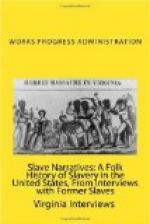“Plenty folks b’lieved in charms, but I didn’ take no stock in such truck. But I don’t lak for de moon to shine on me when I’s a-sleepin’.
“De young Niggers is headed straight for hell. All dey think’ bout is drinkin’ hard likker, goin’ to dance halls, an’ a-ridin’ in a old rattle trap car. It beats all how dey brags an’ wastes things. Dey aint one whit happier dan folks was in my day. I was as proud to git a apple as dey is to git a pint o’ likker. Course, schools he’p some, but looks lak all mos’ o’ de young’n’s is studyin’ ‘bout is how to git out o’ hones’ labor.
“I’se seen a heap o’ fools what thinks ’cause they is wise in books, they is wise in all things.
“Mos’ all my white folks is gone, now. Marse Randolph Shields is a doctor ‘way off in China. I wish I could git word to’ im, ’cause I know he’d look after me if he knowed I was on charity. I prays de Lawd to see ’em all when I die.”
Gabe Emanuel, Ex-slave, Claiborne County
FEC
Esther de Sola
Rewrite, Pauline Loveless
Edited, Clara E. Stokes
Gabe Emanuel
Port Gibson, Mississippi
Gabe Emanuel is the blackest of Negroes. He is stooped and wobbly from his eighty-five years and weighs about one hundred and thirty-five pounds. His speech is somewhat hindered by an unbelievable amount of tobacco rolled to one side of his mouth. He lives in the Negro quarters of Port Gibson. Like most ex-slaves he has the courtesy and the gentleness of a southern gentleman.
“Lawsy! Dem slav’ry days done been s’long ago I jus’ ’member a few things dat happen den. But I’s sho’ mighty pleased to relate dat what I recollec’.
“I was de house boy on old judge Stamps’ plantation. He lived ’bout nine miles east o’ Port Gibson an’ he was a mighty well-to-do gent’man in dem days. He owned ‘bout 500 or 600 Niggers. He made plenty o’ money out o’ his fiel’s. Dem Niggers worked for dey keep. I ‘clare, dey sho’ did.
“Us ‘ud dike out in spick an’ span clean clothes come Sund’ys. Ever’body wore homespun clo’es den. De mistis an’ de res’ o’ de ladies in de Big House made mos’ of ’em. De cullud wimmins wore some kin’ o’ dress wid white aprons an’ de mens wore overalls an’ homespun pants an’ shirts. Course, all de time us gits han’-me-downs from de folks in de Big House. Us what was a-servin’ in de Big House wore de marster’s old dress suits. Now, dat was somep’n’! Mos’ o’ de time dey didn’ fit—maybe de pants hung a little loose an’ de tails o’ de coat hung a little long. Me bein’ de house boy, I used to look mighty sprucy when I put on my frock tail.
“De mistis used to teach us de Bible on Sund’ys an’ us always had Sund’y school. Us what lived in de Big House an’ even some o’ de fiel’ han’s was taught to read an’ write by de white folks.
“De fiel’ han’s sho’ had a time wid dat man, Duncan. He was de overseer man out at de plantation. Why, he’d have dem poor Niggers so dey didn’ know if dey was gwine in circles or what.




